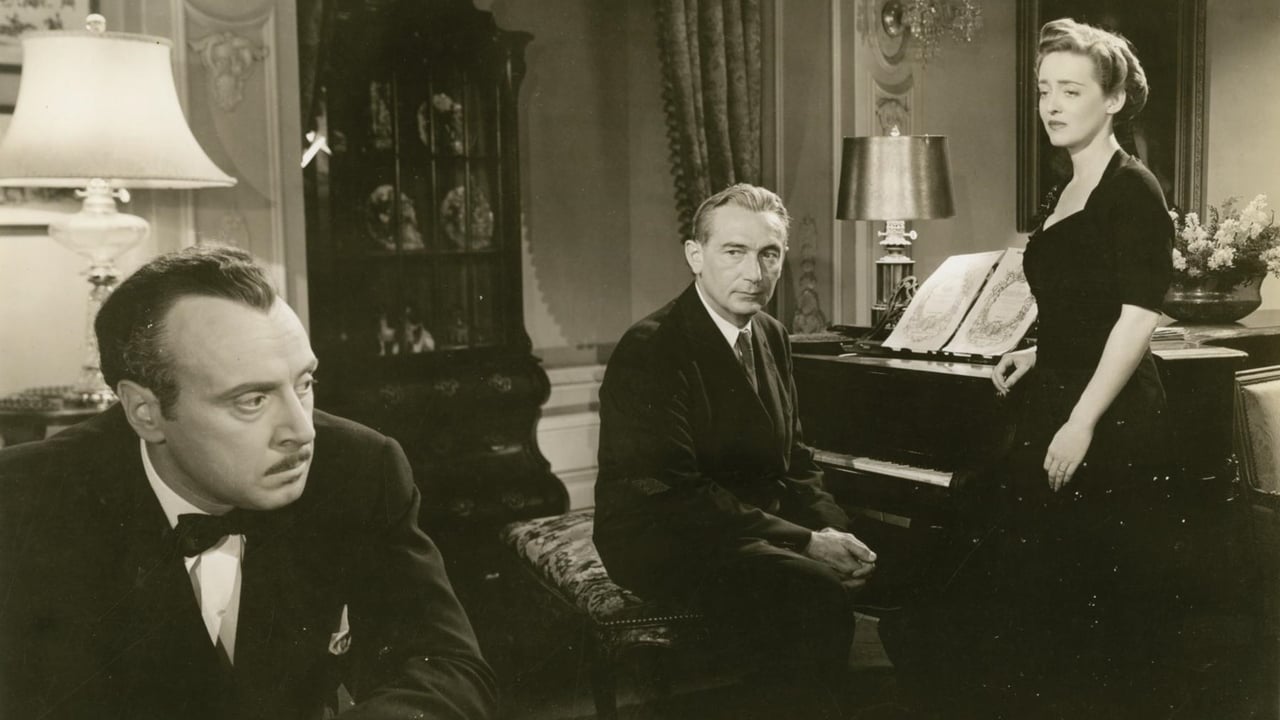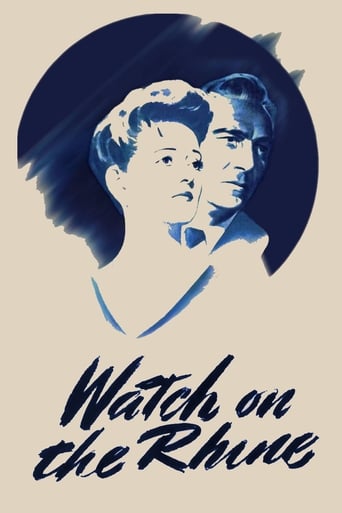

Paul Lukas (in an Oscar-winning performance) plays a German freedom fighter. He flees Europe to America with his wife (Bette Davis) to live with Davis' mother. At her house he meets a nasty Romanian count (George Coulouris) who is pro-Nazi...and begins to discover that Lukas is a freedom fighter.Based on a play written by Lillian Hellman this is well-done but ultimately doesn't work. People don't talk here--they give speeches. It gets annoying. Lukas and Lucile Watson give great performances but Coulouris and (surprisingly) Davis give terrible ones. It also moves slowly and their three kids are incredibly terrible. Even THEY stand around giving speeches. Not a bad movie but an underwhelming one.
... View MoreThis was another high-profile Oscar-winner (for Paul Lukas as Best Actor) which had eluded me thus far; the film is a topical, i.e. wartime, Warner Bros. drama which served as both a prestige production and a vehicle for their No. 1 female star – Bette Davis. Still, the actress is content here to play second-fiddle to Lukas – much as had been the case with the classic comedy THE MAN WHO CAME TO DINNER (1941), co-starring Monty Woolley. Perhaps not coincidentally, both were inspired by plays and, consequently, proved verbose and stylistically limited; indeed, the only other film helmed by Broadway director Schumlin was the loose Graham Greene adaptation CONFIDENTIAL AGENT (1945), as it happened, another espionage thriller.Anyway, WATCH ON THE RHINE (scripted by popular crime novelist Dashiell Hammett – whose THE MALTESE FALCON had been thrice filmed by the studio in the space of a decade! – from the original by his partner Lillian Hellman) also bore a striking resemblance to another recent Warner Bros. effort, CASABLANCA; previewed in December 1942 but opening for general release the following year, it ended up competing with the film under review in some of the top Oscar categories (including Best Picture, Actor and Adapted Screenplay). It is telling, however, that for a movie that underwent major changes during production, CASABLANCA holds together much more firmly than the stolid WATCH ON THE RHINE and, needless to say, also caught the public fancy to a much greater extent – remaining one of the most fondly-remembered Hollywood classics to this day!The comparisons between the two films involve the chase by Nazis for an underground leader: here, it is anti-Fascist German Lukas (quite fine under the circumstances, if frail-looking for the requirements of the role and evidently struggling with the rich dialogue – invariably delivered in a Hungarian accent he never managed to shake off, like his compatriot Bela Lugosi!) who has come to Washington to stay with the family of wife Davis (who seems perennially on the verge of tears here!); also living there are a rather wasted Geraldine Fitzgerald and her ill-suited and impoverished Romanian aristocrat partner George Coulouris, sympathetic to the Third Reich (represented by Henry Daniell and Kurt Katch) despite having fallen out of favour with them. Indeed, when he suspects Lukas' true identity, he realizes it is a chance for him to once again enter into the Party's good books! Davis' relatives (outspoken society mother Lucile Watson – the other Oscar nominee here – and debonair brother Donald Woods, who carries a flame for Fitzgerald) at first are confused by the intrigue but, when it comes to choose sides, they obviously pick up the cause of the Resistance. While the confrontation scenes between Lukas and Coulouris easily emerge as the film's trump card, the speechifying does make for heavy-going viewing (with the schtick relating to the Lukases' indoctrinated yet wide-eyed children tilting proceeding dangerously towards outright boredom!).
... View MoreBased on a Lillian Hellman play (adapted by Dashiell Hammett), this film concerns Paul Lukas and wife Bette Davis coming to live with Davis' mother (Lucile Watson) in Washington, D.C. after running away from the trouble in Europe (the film is set in 1940). Watson is fond of houseguests, and one of them, George Coulouris, is a Romanian with Nazi sympathies. Coulouris soon discovers Lukas' true identity as a fighter with the resistance, which makes trouble. This movie is okay. It builds a bit too slowly and goes on a bit too long. When it gets to the good stuff, though, it is quite good. Davis in particular is in fine form. Lukas won an Oscar. Probably undeserved, as he beat out Bogie in Casablanca, but he's got a few great scenes. Hated Watson, who was also nominated. She's annoying. Also despised Lukas' little robo-children. Two boys and a girl - the girl doesn't say a single word in the film, I do believe, but the two boys rattle on and on and are God awful actors, particularly the younger one, Eric Roberts (not...THAT Eric Roberts! I don't think...). The character's name is Bodo, and if that isn't enough to make you want to punch him in the face, wait until he speaks!
... View MoreWhat a truly, truly rich, moving experience. I love those films made in the war years, as they mean so much and teach so much and have so much more depth and meaning. This movie is no exception. I can see why Bette Davis took the role "for its importance." It teaches so much to the American people of its time - and even now - how we don't really know what it means to be a European in an Old World so often used to the kinds of conflict that created World War II.The movie also strikingly doesn't feel like propaganda, even though the message was clearly to move its audience into action (aren't all worthwhile films aimed at personal change?). It presented a very enlightening, moving perspective on both the German menace and the Underground protagonists. Muller (Paul Lukas) explains how we will one day feel pity for those Germans who just "follow orders" and are really just fools, like De Brancovis (George Coulouris). And the perspective that Muller and the Underground may indeed be like the evil they fight - to see Muller admit he was bad. Situations like this are not black and white.The acting in this are also marvelous. Paul Lukas is an inspiration to watch. The children are so very precious, as is Lucile Watson's character.After seeing this, my sister wanted to learn more about WWII, the Underground, and the Holocaust. Through it, she's had the experience I've had so long ago.In that time, I see character, selflessness, and purpose greater than self. I love it so, and I am saddened by the blatant selfishness that defines today's society. Movies like this inspire me and make me see continually that ideals and convictions can be attained and are indeed beautiful.
... View More